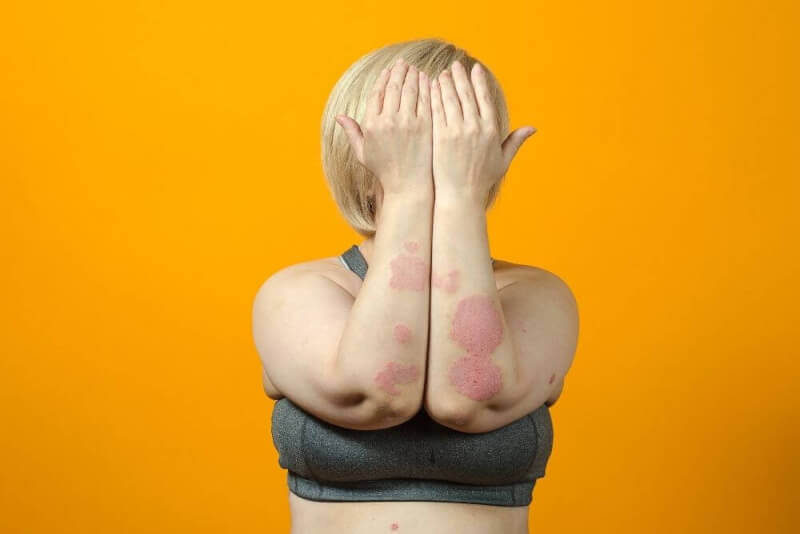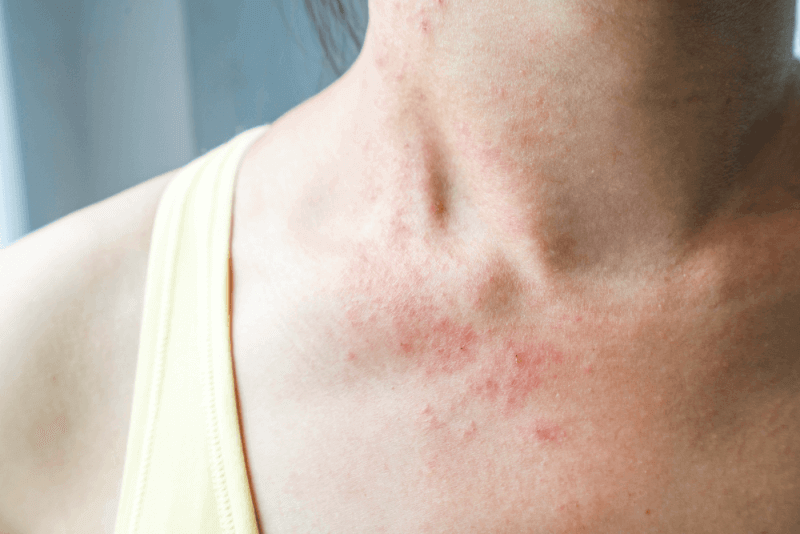Eczema is a skin disease that occurs due to inflammation of the skin. It is also commonly referred to as "atopic dermatitis" in the medical literature. Eczema can manifest itself in patients with itching, redness and crust formation. Skin rashes are also common in advanced eczema.
Eczema is associated with the immunological system due to the disruption of the skin barrier in the body. The so-called skin barrier is the layer that protects the skin from external influences. In eczema patients, this skin barrier is considerably weakened. This causes the skin to overreact to external allergens and irritants.
Today, there are no definitive conclusions as to why eczema occurs. Genetic and environmental factors are cited as the most valid causes of disease. Eczema is more common in individuals with a family predisposition to atopic diseases. Eczema can also be affected by environmental factors such as allergic reactions, food, house dust mites, pollen and animal species.
Eczema Diagnosis Methods
Eczema can usually be diagnosed by a dermatologist after a clinical examination and examination of symptoms. Here are some preferred methods to support the diagnosis of eczema:
-
Clinical Examination
In a clinical setting, the dermatologist may not be able to identify the characteristic features of the disease by examining the parts of the skin affected by eczema.
-
Patient History
The dermatologist reviews the patient's eczema status, listening to the time of onset of symptoms, the severity of symptoms and the presence of atopic diseases in the family.
-
Allergy Tests
In some cases, dermatologists may think that allergies are triggering eczema symptoms and may perform allergy tests. These reversals are made against allergens to which the skin may have an allergic reaction.
-
Biopsy
In severe cases of eczema, a biopsy can be performed in the laboratory to take a sample from the affected skin area. A biopsy provides clearer results than other methods because it confirms the diagnosis of eczema.
Causes of Eczema
Eczema is a complex skin disease and its exact causes are poorly understood. However, dermatologists can identify several causes of eczema. These are the factors that can cause eczema:
-
Genetic Predisposition
People with a family predisposition to atopic diseases are always at increased risk of eczema. When genetic factors passed down from parents combine with environmental conditions, it is inevitable that the skin will respond excessively to allergic reactions.
-
Disruptions in the Skin Barrier
Disruptions in the skin barrier are also known to play an important role in eczema formation. The skin barrier acts as a layer that stops allergic reactions. When this layer is disturbed, the problem of eczema can easily arise.
-
Irregularities in the Immune System
The immune system can work differently in eczema patients. This also causes the immune system to cause inflammation and itching of the skin.
-
Prolonged Exposure to Allergens
Eczema symptoms can also be caused by long-term exposure to allergens. Allergens that cause eczema can include food allergies, pollen, house dust mites and animal species.
-
Irritants
Eczema symptoms can also be associated with the use of irritants. Especially harsh soaps, detergents, perfumes, cosmetics and chemicals can cause skin irritation.
-
Stress
Stress can contribute to the development and worsening of eczema. It has been known for many years that stress has significant effects on the immune system and the skin barrier.
Eczema Symptoms
The symptoms of eczema vary from patient to patient, and the severity of the symptoms may also vary depending on the progression of the condition. But the most common eczema symptoms are as follows:
-
Redness
Eczema usually manifests itself as a rash in the affected area. The rashes can often be mild, but in severe cases they can be very pronounced.
-
Itching
Eczema causes intense itching in patients. Itching, on the other hand, causes irritation of the skin and worsens the rash in patients.
-
Bubble Formation
Eczema rashes are characterized by blisters in some cases. These bubbles are filled with fluid and crust over time.
-
Crusting
Eczema rashes become crusted over time. This leads to the formation of scabs at certain points on the skin.
Eczema Treatment Methods
Eczema treatment is addressed by controlling the complications caused by the disease, reducing inflammation and strengthening the skin barrier. Treatment methods usually develop as follows:
-
Topical Corticosteroids
Corticosteroid creams used on the recommendation of dermatologists play a therapeutic role while alleviating the symptoms of eczema. Ointments that reduce inflammation; they relieve itching, redness and rashes.
-
Moisturizers
Moisturizers, which are frequently used in eczema treatment, strengthen the skin barrier, moisturize the skin and reduce itching.
-
Topical Calcineurin Inhibitors
In some cases it is necessary to limit the use of corticosteroids. In this case, immunomodulatory creams known as topical calcineurin inhibitors are preferred. This controls inflammation and relieves symptoms.
-
Systemic Medicines
In severe cases, medications such as oral corticosteroids or immune modulators are recommended by dermatologists. These medicines are for short-term use and play an important role in controlling serious symptoms.
-
Allergy Treatment
If eczema is thought to be caused by allergies, measures should be taken against allergens to interrupt the source of the disease.
Types of Eczema
Eczema is a skin condition with several different types. Common types of eczema are as follows:
-
Atopic Eczema
It is known as the most common type of eczema. Atopic eczema that starts in childhood is characterized by dry skin, redness, blisters and itching.
-
Contact Dermatitis
Contact dermatitis is a type of eczema that occurs when the skin is exposed to a certain substance. Sensitization or allergic reactions to irritants or allergenic substances occur during contact dermatitis.
-
Seborrheic Dermatitis
Seborrheic dermatitis usually occurs on the scalp and face. It is characterized by oily, yellowish scales, redness, itching, irritation and sometimes thickening of the skin. While it is called "baby dandruff" in infants, it is seen as "psoriasis" in adults.
-
Numular Dermatitis
Numular dermatitis is a type of eczema that manifests as round or oval-shaped red lesions. These lesions usually occur on the arms and legs.
-
Dyshidrotic Eczema
Dyshidrotic eczema is a condition characterized by small blistering rashes on the hands and feet. These blisters, while itching, can become water-filled over time.
Atopic Eczema
Atopic eczema is a chronic and recurrent skin disease. In this condition, the skin becomes inflamed and itching, redness, blisters and thickening of the skin are common. Atopic eczema usually manifests itself in childhood and persists throughout adulthood. Atopic eczema develops with environmental factors as well as genetic predisposition. Weakness in the skin barrier and reactions in the immune system also increase the risk of atopic eczema.
Causes of Atopic Eczema
The exact cause of atopic eczema is not yet known. However, genetic factors are among the most common causes of atopic eczema. Genetic factors can cause the onset of the disease, but they can also exacerbate the symptoms. In addition, factors such as abnormalities in the immune system, weakened skin barrier, exposure to allergens, use of irritants and stress can play a role in the development of atopic eczema.
Seborrheic Eczema
Seborrheic eczema, also known as seborrheic dermatitis, is a skin condition that causes problems such as itching, flaking and redness of the skin. This condition usually occurs around the scalp, face, eyebrows, ears and chest. It also often manifests itself as itching in areas where sebaceous glands are dense. Seborrheic dermatitis occurs when the sebaceous glands in the skin work uncontrollably. The sebaceous glands normally work to keep the skin moisturized and protected with a certain layer. However, certain factors can cause these glands to work intensively, resulting in seborrheic eczema.
Causes of Seborrheic Eczema
Exactly why seborrheic eczema occurs is not yet clearly known. However, it is thought that various factors come together to cause seborrheic eczema. The reasons can be listed as follows:
-
Irregular Activity of the Sebaceous Glands
Seborrheic eczema occurs when the glands in the skin become excessive. This means that the lipid barrier is disrupted due to the intense work of the glands.
-
Fungal Infections
A type of fungus called Malassezia is now thought to play an active role in the development of seborrheic eczema. The problem of seborrheic dermatitis arises due to the overgrowth of this fungus, which is normally present on the skin.
-
Genetic Traits
As in atopic eczema, genetic characteristics are thought to play an active role in seborrheic eczema.
-
Hormonal Changes
Tests have shown that hormonal changes play an important role in seborrheic eczema. Changes, especially during puberty and pregnancy, directly affect the occurrence of dermatitis.
-
Immune System Problems
A weak or overactive immune system plays an active role in the development of seborrheic eczema. An imbalance in the immune system will leave the skin vulnerable to infections and irritation.
Irritant Eczema
Irritant eczema is a skin inflammation that occurs when the skin is exposed to various chemical substances or physical stimuli. This type of eczema can be caused by an irritant that the skin comes into direct contact with or is applied to. Some people may have much more intense complications to irritants. For this reason, people affected often suffer from irritated eczema. In addition, the symptoms of irritation eczema include redness, swelling, blisters, dryness, flaking, scaling, crusting, burning sensation, itching and hypersensitivity.
Causes of Irritant Eczema
Irritant eczema is caused by exposure of the skin to irritants. Irritants can be different for everyone. But irritation is the most common cause of eczema:
-
Chemical Substances
Detergents, cleaning products, soaps, perfumes, cosmetics, dyes and solvents can cause skin irritation. In addition, these substances disrupt and weaken the skin barrier and trigger eczema formation.
-
Physical Irritation
Physical stimuli such as friction or peeling will easily irritate the skin. This also invites the symptoms of irritant eczema. For example, a spot that is constantly exposed to friction is more likely to suffer from irritation and eczema.
-
Extreme Heat and Cold
Extremely hot or cold environments cause skin irritation. In summer, hot water and high temperatures are cited as causes of irritant eczema, while in winter, dry air and cracks are cited as causes.
-
Occupational Triggers
Some occupational groups may experience irritant eczema because they are more exposed to chemicals. For example, cleaners, barbers, health workers and builders are more prone to skin irritations and irritant eczema.
-
Overuse of Hygiene Products
People who frequently use soap, shampoo or disinfectant products also invite irritant eczema due to skin irritation.
Eczema in Babies and Children
Eczema is common in infants and children. Eczema in babies usually manifests itself in the first six months. In children, it can occur in the first five years of life. Eczema in babies and children is called atopic dermatitis. Atopic dermatitis is characterized by redness, dryness, itching, blisters, crusting and risk of infection. At this point, since the skin of children and babies is very sensitive, medical help should be sought as soon as symptoms appear.










R** K** | 18 Jul 2024